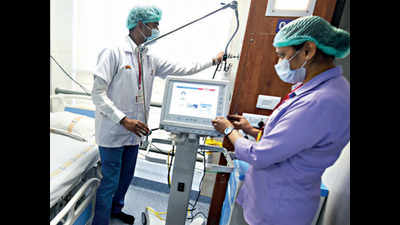- News
- City News
- delhi News
- Coronavirus in Delhi: Hospitals may pool resources for ICU needs
Trending
This story is from March 20, 2020
Coronavirus in Delhi: Hospitals may pool resources for ICU needs
Covid-19, the disease caused by the novel coronavirus, causes mild symptoms in 80% of the patients. But 20% of them suffer from complications, mainly respiratory distress, which may require ICU support. Does Delhi have enough ICU support, especially ventilators, to save them?

Picture used for representational purpose only
NEW DELHI: Covid-19, the disease caused by the novel coronavirus, causes mild symptoms in 80% of the patients. But 20% of them suffer from complications, mainly respiratory distress, which may require ICU support. Does Delhi have enough ICU support, especially ventilators, to save them?
“It depends on the number of cases that can’t be predicted. However, we are fully prepared to deal with any situation,” said Dr Randeep Guleria, the director of AIIMS, which has more than 200 ICU beds at its main hospital.“All hospitals have been advised to postpone non-emergency or routine surgeries so that the current strength of ICU beds can be utilised to meet increased demand, if needed,” he added.

In addition, the National Cancer Institute (NCI) in Jhajjar, also run by AIIMS, and the Trauma Centre have earmarked 125 and 20 beds, respectively, for acute management. Of this, 45 are ICU beds with ventilator facilities. “The number of ICU beds can be scaled up further by pooling in critical-care beds from other departments. We have a plan in place,” Dr Guleria said.
Delhi government runs 33 tertiary-care hospitals with a total bed capacity of 10,059, out of which 3.5% have ventilator facilities. Recently, the government told the high court that 63 ventilators were being procured at 15 hospitals, and it would be completed in six months.
Mechanical ventilators help patients breathe, or breathe for them. They are critical in the management of severe Covid-19 cases because the infection, once it reaches the lower respiratory tract, damages the lungs. “In severe cases, complications can be limited to symptoms such as shortness of breath and low-oxygen saturation. But if this continues despite treatment, the patient may start getting restless and fall unconscious due to less oxygen in the brain,” explained Dr Arup Basu, senior pulmonology consultant at Sir Ganga Ram Hospital. “It can also affect the heart, kidneys and other body parts, leading to multi-organ failure.”
A state health department official said private hospitals, which have a majority of ICU beds in Delhi, have also been alerted. “Their facilities may be utilised for acute management of Covid-19 cases,” said an official. While Indraprastha Apollo Hospital has 218 ICU beds, the Max group about 800 ICU beds, a source said.
Niti Aayog, the Centre’s policy think-tank, recently held a meeting with the representatives of top private hospitals and told them to be ready to create isolation wards. The matter was also taken up in a meeting on Thursday, the source said.
“It depends on the number of cases that can’t be predicted. However, we are fully prepared to deal with any situation,” said Dr Randeep Guleria, the director of AIIMS, which has more than 200 ICU beds at its main hospital.“All hospitals have been advised to postpone non-emergency or routine surgeries so that the current strength of ICU beds can be utilised to meet increased demand, if needed,” he added.

In addition, the National Cancer Institute (NCI) in Jhajjar, also run by AIIMS, and the Trauma Centre have earmarked 125 and 20 beds, respectively, for acute management. Of this, 45 are ICU beds with ventilator facilities. “The number of ICU beds can be scaled up further by pooling in critical-care beds from other departments. We have a plan in place,” Dr Guleria said.
The Safdarjung and Ram Manohar Lohia hospitals, two other central government-run facilities, have also been asked to be ready to deal with any emergency situation. Together, they have more than 200 ICU beds.
Delhi government runs 33 tertiary-care hospitals with a total bed capacity of 10,059, out of which 3.5% have ventilator facilities. Recently, the government told the high court that 63 ventilators were being procured at 15 hospitals, and it would be completed in six months.
Mechanical ventilators help patients breathe, or breathe for them. They are critical in the management of severe Covid-19 cases because the infection, once it reaches the lower respiratory tract, damages the lungs. “In severe cases, complications can be limited to symptoms such as shortness of breath and low-oxygen saturation. But if this continues despite treatment, the patient may start getting restless and fall unconscious due to less oxygen in the brain,” explained Dr Arup Basu, senior pulmonology consultant at Sir Ganga Ram Hospital. “It can also affect the heart, kidneys and other body parts, leading to multi-organ failure.”
A state health department official said private hospitals, which have a majority of ICU beds in Delhi, have also been alerted. “Their facilities may be utilised for acute management of Covid-19 cases,” said an official. While Indraprastha Apollo Hospital has 218 ICU beds, the Max group about 800 ICU beds, a source said.
Niti Aayog, the Centre’s policy think-tank, recently held a meeting with the representatives of top private hospitals and told them to be ready to create isolation wards. The matter was also taken up in a meeting on Thursday, the source said.
End of Article
FOLLOW US ON SOCIAL MEDIA










